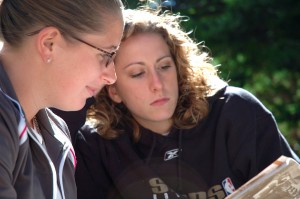 Preparing your child for college demands a lot from a parent – there’s so much to think about and always a concern that your child may not cope well with a new environment. If that child happens to have a sleep disorder of some kind, parents can become even more anxious worrying that they will not settle well and that their disorder may be exacerbated as a result. Here are a few tips to help you prepare your child to adjust to college life, and learn to cope with their sleeping disorder without mom or pop.
Preparing your child for college demands a lot from a parent – there’s so much to think about and always a concern that your child may not cope well with a new environment. If that child happens to have a sleep disorder of some kind, parents can become even more anxious worrying that they will not settle well and that their disorder may be exacerbated as a result. Here are a few tips to help you prepare your child to adjust to college life, and learn to cope with their sleeping disorder without mom or pop.
Some types of sleep disorders
Quality sleep is needed for good health and it can affect mood, hormone levels and weight. Sleep problems therefore impact on the same areas as well as causing tiredness and poor concentration. Common disorders include sleep apnea, sleep deprivation, insomnia, restless legs syndrome and snoring.
Children and adolescents require a minimum of nine hours of sleep per night. This means that sleep problems and a lack of sleep can have negative effects on your child’s performance at college, including during extracurricular activities and on their social relationships. While snoring does not seem like a serious problem, except perhaps for a sleep partner, habitual snoring does in fact have an adverse effect on the quality of sleep of the person who snores. Nightmares, night terrors and sleepwalking are among many disruptive disorders known as parasomnias. When sleep apnea is a problem, the child’s breathing becomes disrupted regularly during sleep and they may experience restless nights, fatigue during the day and poor concentration, which of course makes it difficult for them to study effectively.
Coping mechanisms
Approximately 10 percent of Americans experience parasomnia at some time in their lives and the good news is that many children stop doing so as they mature. Developing good sleeping habits can help enormously, including keeping to a regular sleep schedule, learning how to avoid and manage stress, creating a relaxing bedtime routine and making time to get sufficient sleep. Parents who have not already done so should encourage their child to undergo a professional evaluation procedure at a specialist sleep center, such as Rowe Neurology Institute. Experts here study sleep patterns and use a holistic approach, treating each individual according to their lifestyle and habits. Working with your child, they develop a goal for better daytime function and improved quality of life.
Support at college
No matter what type of sleep disorder your child has obviously it’s not possible to go to college with them to help at night! Instead, sitting down together to work out a plan of action will give you confidence that your son or daughter will manage their condition well. It will also be useful to talk to college roommates and if dormitory accommodation is provided, be sure staff and students understand that a person who suffers from parasomnia should never sleep on a top bunk or next to a window. Remind your child to remove any sharp objects from the area around the bedside and coach roommates on how to deal with them if they are found sleepwalking – by speaking softly to them and guiding them by the elbow, so they can be taken back to bed.
Long-term help
If the problem persists or becomes very disruptive, then seeking help from a therapist may be the next step. Sometimes seeing the record of an overnight sleep study can help, particularly if this uses audio and video. Medication is usually only recommended for specific purposes as it will not block out the small disturbances that generally cause parasomnia. Certain other conditions are associated with sleep disorders, including irritable bowel syndrome, hypertension (high blood pressure), headaches and acid reflux and addressing these may improve the quality of sleep in the longer term.
If obstructive sleep apnea (OSA) is a problem then CPAP therapy may work. This is continuous positive airway pressure and the treatment works by using very mild air pressure to keep a sleeping person’s airway open, thus preventing snoring and sleep apnea. CPAP machines are small, silent and eminently portable so taking one to college should not be a problem.
Some people find natural remedies, such as herbs and aromatherapy to be helpful for insomnia. Valerian has been subject to scientific studies and found to have sleep-inducing properties, acting like a sedative on the nervous system and the brain, and many people keen to wean themselves off sleeping pills take the herb before going to bed.
